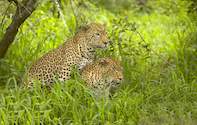
Farmers, game wardens, nature conservation officials, scientists, hunters and conservationists all met at the Southern African Wildlife College from April 10 to 14, 2005 to discuss the leopard population in South Africa.
A select group of the delegates has now formed a leopard working group, and will spearhead leopard conservation in the country. Gerrie Camacho, big cat specialist from the Mpumalanga Parks Board, was appointed to the committee. He said that one of the committee's priorities is to get information together. "We hope to channel information for policies. It is well due for the forum to be formed."
He said that the current information on leopards is very fragmented and it is hard to make credible decisions from this. He added that most of the knowledge of leopards comes from within conservation areas, and more information is needed on leopard populations outside of those areas. The Department of Environmental Affairs and Tourism commissioned the Conservation Breeding Specialist Group of the IUCN (World Conservation Union) Species Survival Commission to hold the meeting.
The meeting was convened partly because of a public outcry over the doubling of the number of Cites (Convention on the International Trade in Endangered Species of Flora and Fauna) permits allocated to trophy hunt leopards. South Africa can now legally hunt 150 leopards, although this year it is sticking to its previous quota of 75. At the Leopard Population, Habitat and Viability Assessment all the known information about leopards in the region was discussed. Experts from different parts of the country all provided input on the situation in their areas to complement published data.
A computer model was used to try and predict how various factors would affect the leopard population in future. Errol Pietersen, warden of the Umbabat Private Nature Reserve adjoining the Kruger National Park, said that the process highlighted the resilience of the leopard, but also revealed the gaps in our knowledge of this secretive animal. "There is a need for coordinated research." He added that wildlife corridors were highlighted as important for the viability of the species, linking populations in various areas.
Learn more Facts about Leopards

